
Smart TVs
A hacked smart TV presents problems on many levels. A prankster could switch channels on you, order movies you don’t want, or blast the volume when you least expect it. On another level, a hacked TV can have a direct impact on your security and safety, according to Andrew Newman, CEO and founder of Reason Software Company. Hackers can mine your TV apps (Netflix, Hulu, etc.) for payment information and can use your TV as a gateway to get into other connected devices in your home. “Researchers have found that many manufacturers set the same default passwords for the same type of devices, and often users don’t change them. This means that if you have ten network-connected devices and at least one of them you didn’t take care of—the whole network is compromised.” Change your passwords every three to six months to protect yourself, and make sure you heed these other 20 secrets from home security installers to keep your property safe.
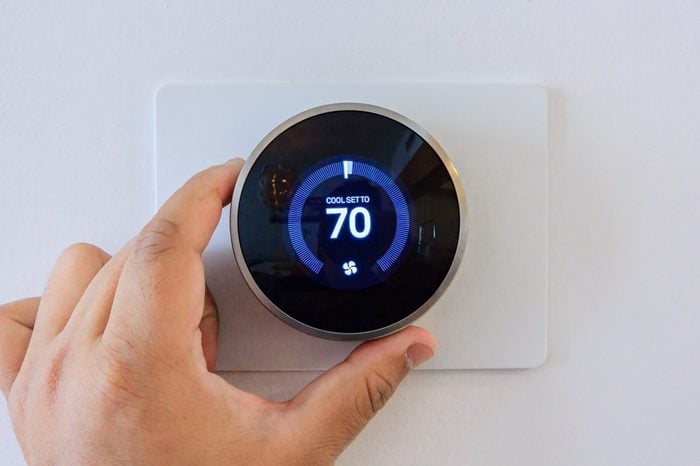
Thermostats
While it’s cost-effective and handy to be able to control the temperature of your home while you’re out—say cranking up the AC when you’re headed home from the office—smarthome systems are vulnerable, says Jason Hart, VP and CTO for Data Protection at Gemalto. “Hackers can control a thermostat and crank up the heat until the owner pays a ransom.”
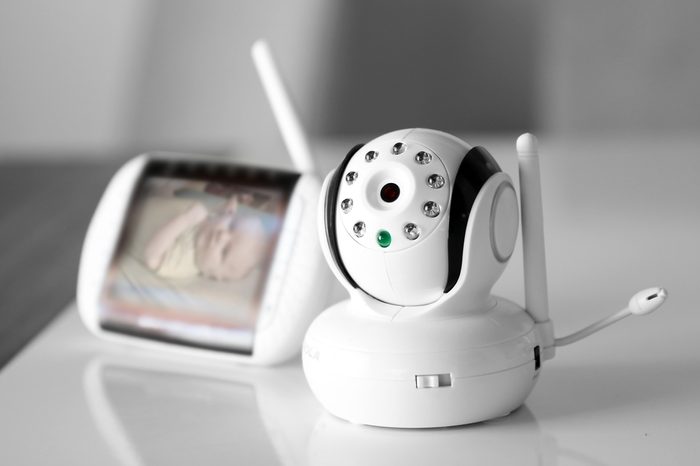
Baby monitors
Baby monitors are often connected to your WiFi network, because you want your mobile app to be able to connect to it at any time. That becomes a problem, because, as Eitan Bremler, co-founder and VP of product at Safe-T, explains, “Most people don’t change their baby monitor’s default password and make it visible to the Wi-Fi network, meaning that any hacker can scan for transmitting IPs and find it.” If and when that happens, that means hackers can tune in and watch your baby and you at any time of day. To ensure your monitor is not hacked, Bremler recommends doing the following: 1. If the product supports it, make it invisible to Wi-Fi scans. 2. Change the default password to one of your own made up of a random sequence of letters, numbers, and characters. That should keep burglars at bay, just like these 21 other things burglars don’t want you to know.
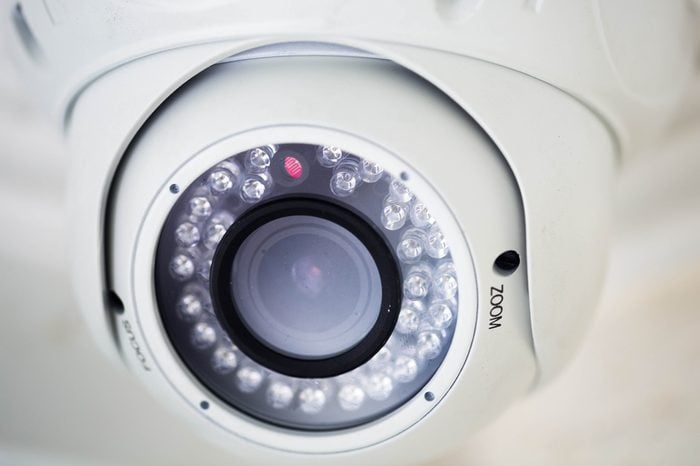
Smart cameras
Before you snap that next picture, consider this: many popular smart cameras have vulnerability issues, says Vladimir Dashchenko, head of vulnerabilities research group, Kaspersky Lab ICS CERT. “These issues could allow attackers to remotely access video and audio feeds, disable the devices, and execute arbitrary code through the cloud.” What can you do about it? Use a home security solution to keep track of all the devices connected to your network, and regularly check for software updates and install them when prompted, he suggests. Here are more things you never knew about home safety.

Pacemakers
Hacking your heart is a real thing! The FDA recalled 465,000 pacemakers in 2017 for fear that security problems could lead to people with bad intentions changing the pace of someone’s heartbeat—possibly resulting in death. Health devices like pacemakers are susceptible to outside interference, giving rise to a very niche corner of the cybersecurity world, says Mike Kijewski, CEO of MedCrypt, which uses code to secure data and instructions in medical devices, and then monitors those devices in real time.
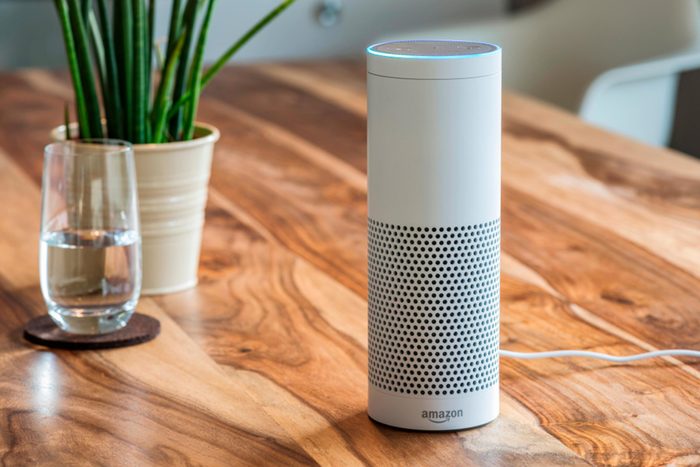
Voice-activated speakers
Even news of millions of so-called smart speakers being hacked right before 2017’s holiday season didn’t seem to slow down sales of Amazon’s Echo and Google Home. But if you have either, you should definitely take precautions against hackers. If these speakers are hacked, they could divulge sensitive information such as when you’ll be out of town or any upcoming doctor’s appointments, along with your credit card and bank account info, shares NBC.com. Equally alarming, if it’s connected to your home security system, a hacker could simply turn it off and walk right through your front door. To keep yourself and your home safe, limit how much info you connect through these types of speakers and unplug it when you go on vacation. Don’t worry—there’s no risk with these 15 hilarious things you can ask Alexa to do.

Default passwords
As many of these experts have noted, many connected devices come with a default password that are easy to figure out. How so? With a simple Google search. “It only took 30 minutes to find passwords for most of the devices and some of them were found only through a Google search of the brand,” says Omer Shwartz, a Ph.D. student and member of the lab being run by Dr. Yossi Oren at Ben Gurion University’s Cyber Security Research Center. If you aren’t sure how to create a hacker-proof password, this website can help you.

Picture frames
Those digital frames that let you change art with the swipe of your hand are perfect for proud grandparents—and hackers, too. Sara Haghdoosti from Mozilla shares that “if hacked, the frame’s ambient light sensors can help a thief know the comings and goings in your household.”

Garage door openers
Opening and shutting your garage door with the click of a button is a convenience that has been around for decades. But if a smart version is hacked, it could clue a burglar into your daily habits, such as when you leave for work for the day and when you’re out of town. Again, make sure that you’ve updated its default password and change it on occasion.

Entire neighborhoods
Ambitious hackers can put a stranglehold on entire blocks. Jason Hart from Gemalto, says the hackers “use IoT devices to compromise Wi-Fi networks and access personal data and passwords—putting families throughout an entire neighborhood on the road to financial ruin that only begins with looting of bank accounts.” If you notice any of these 12 red flags on your computer, someone could be spying on you.

Cars
As was reported by Wired, researchers at the Beijing-based security firm Qihoo 360 were able to unlock and start cars using a pair of gadgets they created with just $22 worth of materials, making it ridiculously easy for a thief to steal your car. If you own one of these 10 cars, it is much more likely to get stolen.

Cell phones
Former Green Beret Sgt. Major Karl Erickson says that he carries his phone in a signal-proof case. “From my experience in the military, I know how easy it is for a bad guy to slip next to you while you’re standing on line at Starbucks and, in just a few seconds, clone your phone and know everything on it, including the credit card number you’re using to buy that latte.”
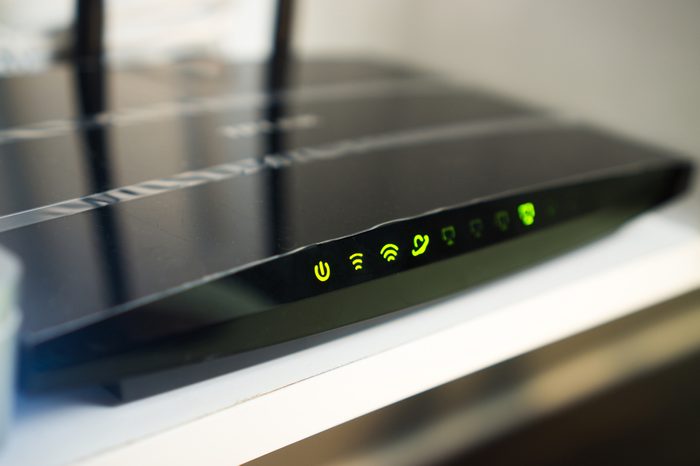
Home Wi-Fi routers
It’s not hard to imagine how much damage can be done via a hacked router, says Andrew Newman, CEO and founder of Reason Software Company. “Wi-Fi can lead to Google account access or identify theft. Depending on how ‘smart’ your home is, it can pose a real danger, like disclosing information about your family’s activities, and granting physical access to your house or car.”

Landline voicemail
You might not have a landline at home anymore, but many businesses still have them. And when a new employee starts, they typically are given a default password like 1234. And guess what? Most employees never change it. If you want to ensure no one is listening—or deleting—important messages, you’ll want to change your password ASAP. And be sure to look out for these phone scams that could steal your money.
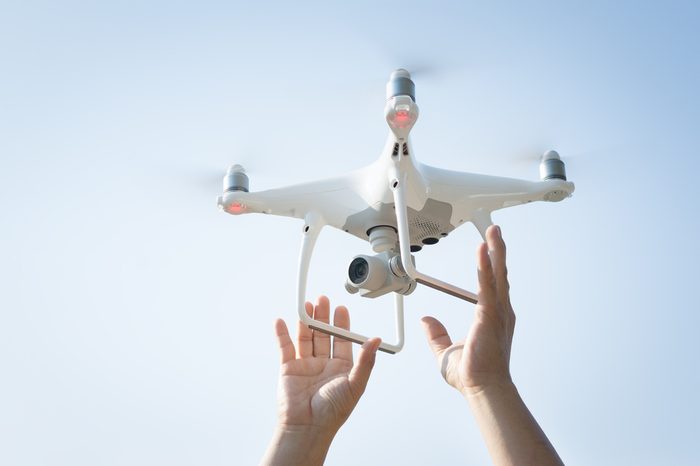
Drones
According to a report on Hacker News, security researcher Jonathan Andersson revealed hardware he called Icarus, that could hijack drones mid-flight. While signal jamming devices are not new, Icarus is the first known hardware that allows the hacker to gain total control of the drone, including the ability to steal your pricey new toy.

Refrigerator
Your fridge can be your worst enemy when it comes to your diet—and when it comes to security. As we’ve seen, any device or appliance in your home that is connected can be a gateway into your entire home. Consumer Reports shares that Samsung smart fridges were wired in a way that left users’ Google log-in credentials up for grabs. That’s why it’s more important than ever to memorize the 16 signs you’re about to be hacked.
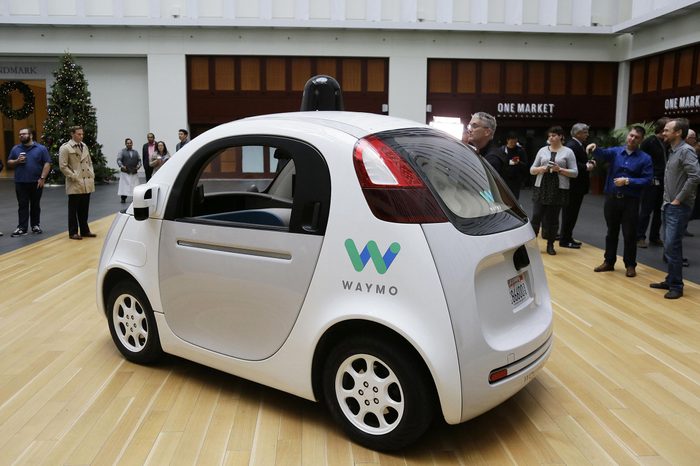
Self-driving cars
As if the very idea of a car with no human driver isn’t scary enough, Damien Scott, the chief commercial officer at self-driving startup Renovo, told the Financial Times that self-driving cars could, indeed, turn into everyone’s worst nightmares. If these cars are hacked, it, “allows a malicious remote attacker, who can conceal their identity and location, to gain direct control over a compromised vehicle’s throttle, brake and steering.” In the same article, he noted the need for industry-wide efforts to make hacking autonomous vehicles impossible.